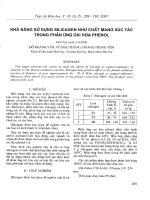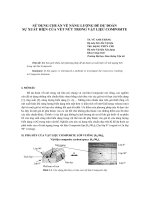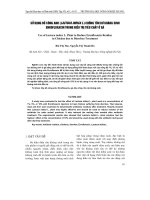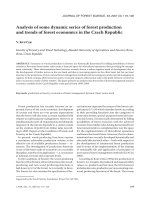Báo Cáo Lâm Nghiệp:Sử dụng đất và chất lượng nước landuse and water quality
Bạn đang xem bản rút gọn của tài liệu. Xem và tải ngay bản đầy đủ của tài liệu tại đây (38.22 KB, 5 trang )
Name: Nguyen Huu Dung
ID: 1353091031
FINAL REPORT
Summary: ”Forests and Floods, drowning in fictions or thriving on facts”
After reading report , as far you known on the facts from Asia floods consequences
that in the report’s according to be 46,000 people affected by flood in China (2004) ,
3.5 million people in Cambodia and 5 million people from Vietnam in 2000 and
Bangladesh and India are 5 and 30 million respectively. In addition, floods impacts
on socio-economic of countries in Asia, the flood in Cambodia and Vietnam damaged
up to US$145 million and US$285 million respectively…etc. Disastrous floods was
mentioned in many debates by its consequences for millions of people each year and
floods was become a political issue. By rushed of the official, they rushed in finding
immediate reasons and also solutions in short-term. It has lacked of the outwardness
from another factors . Almost of people has strong belief that forests can prevent and
reduce the effect from floods, this one come true because we could not deny that role
from forests. But when they said that flood happened “only or almost” cause by
deforestation and degraded of forests. It comes wrong. The report also mentioned
about those “ knowledge” mostly based on wrong logical, or a “myth” in report ,
simple awareness with a complex issues. It seem likely that not preferred to science
more. So it was wrong from whole methods and methodology by extrapolating with
inter-relationship by observation between quite different from each other conditions
and characteristics but with same conclusions. The wrong thing here is with jute or
deep water aman rice in Bangladesh that they need seasonal flooding. One question
that what happen whether without floods each year? So wrong thing which I
mentioned about was : we deny all of roles from floods or seasonal floods, we just
drawn whole our consequences from floods, how much money? , how many people
died? It is not fair and lack of outwardness with floods.
In distinguishing the fact from fiction. The author indicated that: “Hamilton (1985)
has characterised this situation as ‘The 4 Ms: myth, misunderstanding,
misinterpretation, and misinformation”. The author mentioned about reason why it
come wrong and misunderstanding . Because of belief and knowledge of people or
whole foresters and officials denied scientific frameworks. One more reason is
generalizations of knowledge that inter-relationship between hydrological process and
forests. It not appropriate on facts. Cause by misunderstanding by many sources such
as articles, newspapers, websites…which is more easier in approach to people while
not sure in generalizations and lack of outwardness. It lead to misunderstand from
readers and listeners.
In this report, author also mentioned about “sponge theory” although this theory was
not recognized but so many people included by foresters agrees. So an example for the
sponge theory is Himalayan sponge (Myers 1986), it seem likely exaggerated when
describe about roles of forest: “swollen during the wet season” and “soaking up
abundant rainfall and storing it before releasing it in regular amounts over an extended
period”. I did not deny forest roles but he was amplifying the role of forests much.
Other side in order to attack to theory that forest increased the base flows in dry
season. Because almost water infiltrated was back to plants. So with another studies
show that main factors impacts on and lead to increase flood events based on rainfall
and geomorphology (Bruijnzeel 1990, 2004; Calder 2000; Hamilton with King 1983;
Kattelmann 1987) such as elevation, slopes, soil types,…etc.
It is almost same with reduce the stream flow and prevent floods, the author give some
disadvantages of forests in reduce erosion and sedimentation, cause by detachment
from natural forests compare with another types of cover land which give more
advantage than forests by use less water, indirectly increase flows in dry season. The
author also indicated that some factors such as grazing, make road in exploitation…
etc. In addition, author show the aspect that same with reduce stream flows and
erosion that did not based on forest cover, most based on topographic, local climate,
and geographical characteristics. About aspect that impacts of scale on flooding and
frequency of floods, the author also identified that whole of scale and frequency of
floods did not affected by forests by anyway, floods still happened when forests
developed normally. It can be affected by climatic process more such as cyclical warm
ocean currents. About Perceptions of the destructive power and severity of floods, the
author recognized that the flooding can be more seriously damage to people cause by
urbanization lead to land compaction decreased infiltrated ability with the inefficient
water-drainage systems was not good enough to control and reduce consequences of
floods. So people exacerbated the problems caused by floods and the media
development report immediately information about accidents than previous time and
the journalist want to readers focusing on it, journalist may use much shocking data,
exaggerated information.
About efficient management method, we need to combine both of uplands and
lowlands, in natural method not against them, we need to seek solutions for uplands
for reducing floods and reduce damages in lowlands for adapt with flooding in future,
this approach method need to integrate with uplands land use management plans. It
considered socio-economic of local communities living in both of watershed and river
basins. This method need to base on own natural conditions of local, land use
characteristics of country, states, and also depended on scientific order logical was
recognized , not myth or sponge theory. The order logical which I mentioned: specific
objectives which we need to archive, not aim we hope to get; planning based on
objectives and suitable with land use and policies of local; implementation need to
implemented for truly plans taken; closely monitored interventions and policies for
changing them whether to be adverse effectiveness; regularly evaluation adapted to
novelty from another research or people need.
The author focused on 3 central ideas means 3 key directions to archive objectives:
base on efficient management in watershed, floodplain and also based on those
objectives and land use characteristics, local natural resources to take suitable policy
decisions. In watershed management, author taken some main point that we should
classify and make planning for land use, develop socio-economic for local people to
come true sustainable development. It could be encouraged behavior of local benefits
to watershed by roles of watershed in water supply and benefit about money for their
behavior. And the floodplain management, we need to know that we just could be
adapted and reduce, we have never ever denied roles of forests, but we need to know
that forests was not seem likely sponge theory. With policy decision, we integrated
upland and lowlands management comes true sustainable management whole forest
management and socio-economic development in buffer zones and watershed, in order
to encourage local people from policy give benefits for them. Land use planning and
integrated approach need to base on local characteristics, and natural resources from
watershed areas. The author also mentioned about new technology from models in
order to reduce affects from harvesting, exploitation, and urbanization impacts on
flooding.
Actually, in my opinion, I think that whole report was given us some truly information
about inter-relationship between forests and floods which we came misunderstand
about. Totally, forests has roles in reduce affects from floods compare with urban
areas and another aspects of hydrology that prevent soil erosion, and improve the
water quality as water supply. But people belief about roles of forests in sponge theory
is much more than it could be about frequencies, erosion, stream flows, scales of
floods …etc . we did not deny roles of forest but journalists show it more bigger than
its. From those analysis aspects of report, we need to look back to our activities that
means exact human make floods come more serious by urbanization, and
exploitation, by overgrazing, roads, soil surface compaction..etc it was not
deforestation or harvesting more.
From this lesson, we need to look up in scientific and specific which was recognized
by many scientists that come true. And another aspects that methods for watershed
management that we need establish a specific plan for management. The plan need to
base on local characteristics and natural conditions, each step have to base on
objectives which we ought to archive,. And we also need a implementation group for
check out whole process and also support to techniques, instruments and news
updated from another scientific research. Moreover, the plan can be improve the
policy or fix by policy suitable, it depended on results of research, not myth and
sponge theory. We ought to have more scientific research in long-term for archive
new and outwardness data with truth!









